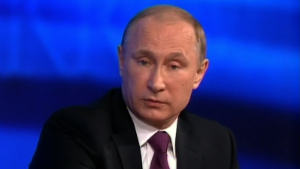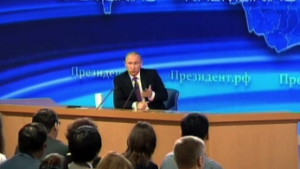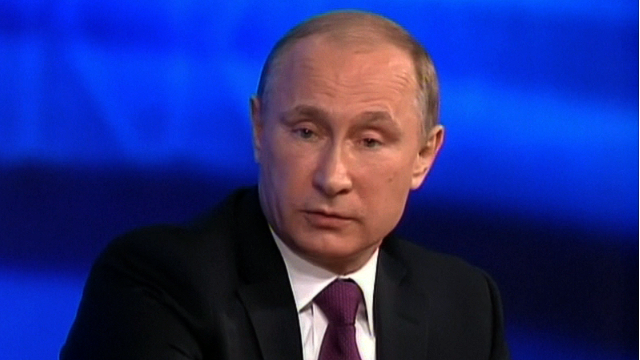http://edition.cnn.com/2014/12/18/world/europe/putin-speech-dougherty/index.html?hpt=hp_c2
Crisis, what crisis? Putin's marathon news conference
December 18, 2014 -- Updated 1902 GMT (0302 HKT)
STORY HIGHLIGHTS
- Putin's first challenge was to assure Russians they can overcome an "unfavorable scenario"
- The Russian president said the Ukraine conflict should be settled peacefully
- Putin is adept at turning the tables, writes Jill Dougherty
- Putin: "We can't have a palace coup because we have no palaces"
Editor's note: Jill Dougherty is a public policy scholar with the Woodrow Wilson International Center for Scholars in Washington. She was CNN's Moscow bureau chief for nine years.
Moscow (CNN) -- President Vladimir Putin's news conferences aren't at all like news conferences I used to attend in Washington, when I covered the White House.
First, there are the stuffed animals. Since there are more than 1,200 journalists in the giant hall, they have to attract President Putin's attention some way, so some bring stuffed animals, raise home-made signs, or wear T-shirts specially printed up to advertise the region or news organization they come from.
Then there's the length of the conference. This one was the usual length -- three and a half hours. Others have been longer.
This was Vladimir Putin's 10th news conference and it couldn't have happened at a worse time. As the Russians say, the smell of kerosene was in the air. The value of the Russian currency, the ruble, was dropping like a stone, the U.S. and Europe were just announcing yet more sanctions, Russia was on the verse of a recession, but the president refused to call it a "crisis."


Striding into the hall, Putin appeared cool, calm and collected. Close-ups of the president's face were broadcast on two giant screens on either side of the hall, his every glance, every gesture visible.
Putin's first challenge was to assure his fellow citizens that Russia can overcome what he called an "unfavorable scenario" and he promised that would happen -- in two years, maybe less.
There was no real mea culpa for Russia's economic predicament. Putin admitted only that the Russian Central Bank and the government could have reacted more quickly to the economic challenges. Instead, he blamed Russia's economic woes on "external" factors, asserting that economic sanctions account for just "25 to 30%" of Russia's economic problems.
When a BBC reporter asked him about a "new" Cold War, Putin leaned forward like an athlete, insisting that that Russia is simply defending its own interests. Moscow, he said, has only two military bases outside its territory but the U.S. has bases "all over the world." They told us there would be no NATO expansion, he complained, and now the West is building new virtual walls around Russia.
Putin is adept at turning the tables. One journalist asked him about reprisals by Chechen authorities against the families of alleged terrorists, accusing Russia's government-financed TV channels of igniting hatred in society.
Putin quickly pointed to the torture report just released by the White House. The U.S. he said, "legalized torture" and even developed a method for carrying it out. "How do you explain that?" he asked indignantly.
Putin spoke for several minutes on the image of the Russian "bear." The West, he claimed, won't leave the bear in peace, but wants to "chain" it, "de-claw it," unless it sits obediently in the forest, eating berries.
If there was one promising note, it was the Russian president's statement that the conflict in eastern Ukraine should be settled peacefully. He acknowledged that there were Russians in eastern Ukraine, but they were "volunteers."
Surprisingly, the president called on some journalists who are not known as being friendly to the Kremlin and there were some uncomfortable questions. When Putin said there's a "fine line" between the opposition and a "Fifth Column" -- in other words, traitors to Russia -- reporters twice followed up with pointed questions, including a demand that he name those members of the "Fifth Column." He did not.
Others asked him what is the salary of Igor Sechin, head of the Russian oil giant Rosneft? He said he didn't know.
In one of the most dramatic questions, a Russian reporter asked Putin if he is worried that members of his inner circle could carry out a "palace coup?"
Putin, who in spite of his somewhat fierce image abroad, does have a sense of humor, defused the question with a smile.
"We can't have a palace coup because we have no palaces," he said. Stability is based on support of the Russian people, he said, and "the people believe we are acting in their interest."

沒有留言:
張貼留言